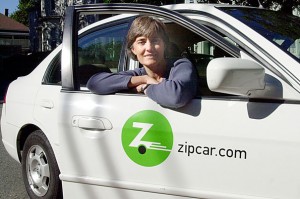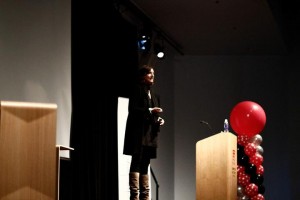Women 2.0 Conference 2012 | For The Men Who Missed It
 Just like the sky scraping investment banks of Wall Street, the technology industry tends to be a sausage party. A Silicon Valley conference is a room full of suits, with the occasional skirt suite. So when I heard about Women 2.0 pitch and technology competition at the Computer History Museum in Mountain View, CA, I couldn’t help but feel like it might be a hall of crickets with a few passionate women warming the front row. I was overwhelmingly mistaken.
Just like the sky scraping investment banks of Wall Street, the technology industry tends to be a sausage party. A Silicon Valley conference is a room full of suits, with the occasional skirt suite. So when I heard about Women 2.0 pitch and technology competition at the Computer History Museum in Mountain View, CA, I couldn’t help but feel like it might be a hall of crickets with a few passionate women warming the front row. I was overwhelmingly mistaken.
A 50 car line stacked up the street from the conference entrance filled with women idling, applying mascara, brushing their hair, and finishing early morning conference calls. I had planned to get there early to attend Flickr and Hunch co-founder, Caterina Fake’s morning keynote at 9:20 am. But after the lady car queue and a filled parking lot, I managed to screech in for the second keynote by Zipcar and Buzzcar co-founder, Robin Chase (we had some seriously ambitious females speaking, many with multiple successes under their belts).
The room was flooded. Seats filled to capacity, walls colorful with leaners and not a space on the floor to decipher the carpet pattern; all in laughter as they listened to Chase’s tales from the front lines of Zipcar‘s early days. She was walking us through the first few months of inception, about 4 months into the project, with just one beta car that sat outside her house for people to come and grab using keys she had hidden on her porch. Explaining that customers were

able to sign up online and rent the car, with only $50,000 invested in the company, which went towards the website, database and beta car. The audience listened in anticipation, as Robin explained how she was 3 days before launch with $63 left only to find out that to rent 3 more cars for launch she needed $21,000 in deposit money. It so happened that just that day she had ran into an old friend who had asked her why she looked so stressed. “I need $25,000 by tomorrow morning or we can’t launch!” Within the next 8 hours he had wired her the money, as the story goes, sending the perfumed crowd of Women 2.0 into wild applause.
Chase had many tidbits of information for the room of lady innovators from “every single person is your free consultant” to “make sure you are an ‘I can make that person’ versus ‘I can buy that person’ if you want to be an entrepreneur.” Before Robin Chase left the stage, she left the delighted crowd with one great piece of advice that we often forget as women, fight for your rights, “being private and founder owned is not negative,” pointing us to Rose Industry’s female founder holding a $2 billion private company.
Next up, came a round of female startup pitches to be judged by female partner at KPCB, Aileen Lee, angel investor, Christina Brodbeck, the charismatic, talkative and often controversial, Dave McClure of 500 Startups, as well as managing partner of AngelPad, Thomas Korte, and DFJ investment professional, Rachel Pike, to round out the majority of lady judges. It was a tough judging panel indeed as we watched McClure grill the girls behind Perfect Beauty, a niche ecommerce website for beauty products and interaction, followed three other eager pitches.
Following Perfect Beauty, a vivacious financial advisor presented Prosperity (spendonpurpose.com), a finance management system for small business owners. Labeling it a “behavioral based software” with 2600 paid subscribers, CEO, Leanne Ozaine-Smith found her niche through her love of teaching finance one-on-one. McClure also took no shame, explaining scalabity with Ozaine-Smith’s model built around one-on-one training sessions with her personally as part of the service, as a problem soon to be faced. Although, with a bright spark, the audience could easily relate to early traction with personal sessions with Leanne. Her presentation was captivating, despite a fearful judging panel of the scalability problem.
On the flip side, the panel congratulated the following presentation by CEO, Tara Hunt, for trying to tackle the difficult ecommerce space with her startup, Buypsphere. Hunt strives to improve product search with crowdsourcing through product questions, comments, and reviews. She called it the “Quora for shopping,” which is two words that this 500 women at Women 2.0 likely relate to.
Although, the judges were tough on the startup presenters, there was much to take away from their comments. I decided to sum them up, for all the men who unfortunately do not get a welcoming invite to Women 2.0:
- While presenting, if their are any technical failures or moments unplanned, take that time to engage with the audience and keep them tuned in
- Always think about scalabilty, even in the beginning
- investors look through press, do not use it to explain current traction
- Find 3-5 niches and focuses when choosing an audience
- Understand the psychology of Persuasion
- Register your company on Angel List early if you know you will be looking for funding
 With much to think about from the pitches we were promptly greated by Facebook director of platform and social marketing, Katie Mitic for more inspiring startup tips. A member of the EBay board, with a strong female voice in the inner working of Facebook, it was no surprise to find her to be a charismatic speaker. Katie started with personal stories and spoke of her mission in social as humanizing technology. She left us with 3 main points in building a company:
With much to think about from the pitches we were promptly greated by Facebook director of platform and social marketing, Katie Mitic for more inspiring startup tips. A member of the EBay board, with a strong female voice in the inner working of Facebook, it was no surprise to find her to be a charismatic speaker. Katie started with personal stories and spoke of her mission in social as humanizing technology. She left us with 3 main points in building a company:
- Start with a mission. Be big and ambitious, as this will be what inspires people to build with you.
- The first ten people make the culture. choose them carefully.
- Ship early and often. Build it, get it out, learn, repeat. This is the main objective of any company.
Mitic lastly left us with one powerful piece of advice that Robin Chase also heavily touched upon:
Products that are successful are not only product that you as an entrepreneur love, but your users love as well. Don’t build a product they like, build a product they love.
I couldn’t help feeling that love was in the air as we gathered for Women 2.0 on Valentine’s Day to tell tales explaining why women love technology—perhaps more than a currently male dominated Silicon Valley would assume.








